==================
Affiliate Statement and a Caveat
First off, a little caveat: within my articles you will find affiliate links, meaning if you buy them, I get a small commission. Your cost is not affected. In addition, I am an Amazon Associate and I earn from qualifying purchases on Amazon.
And yes, if I say that I recommend a product here, it means I truly believe it is a good product. I refuse to recommend any product that I have not researched and believe to be a good value.
Even better, I provide you with a very clear picture of the product, it’s use, and the probable value.
Earning your trust is important to me. I run this website myself and the commissions and donations help support the site.
Sound reasonable and fair enough? Let’s continue to the article.
==================
Our family stays busy most of the time. Farm life, jobs, and life keep us busy. But when we have a little indoor relaxation time, we often pull out our game table and one or two of our favorite board games.
Benefits of Family Board Games: Fostering Fun and Bonding Time
Family board games are a fantastic way to bring everyone together for some good old-fashioned fun. We love how they create opportunities for laughter, learning, and meaningful connections. Playing board games as a family can strengthen bonds and improve communication skills.
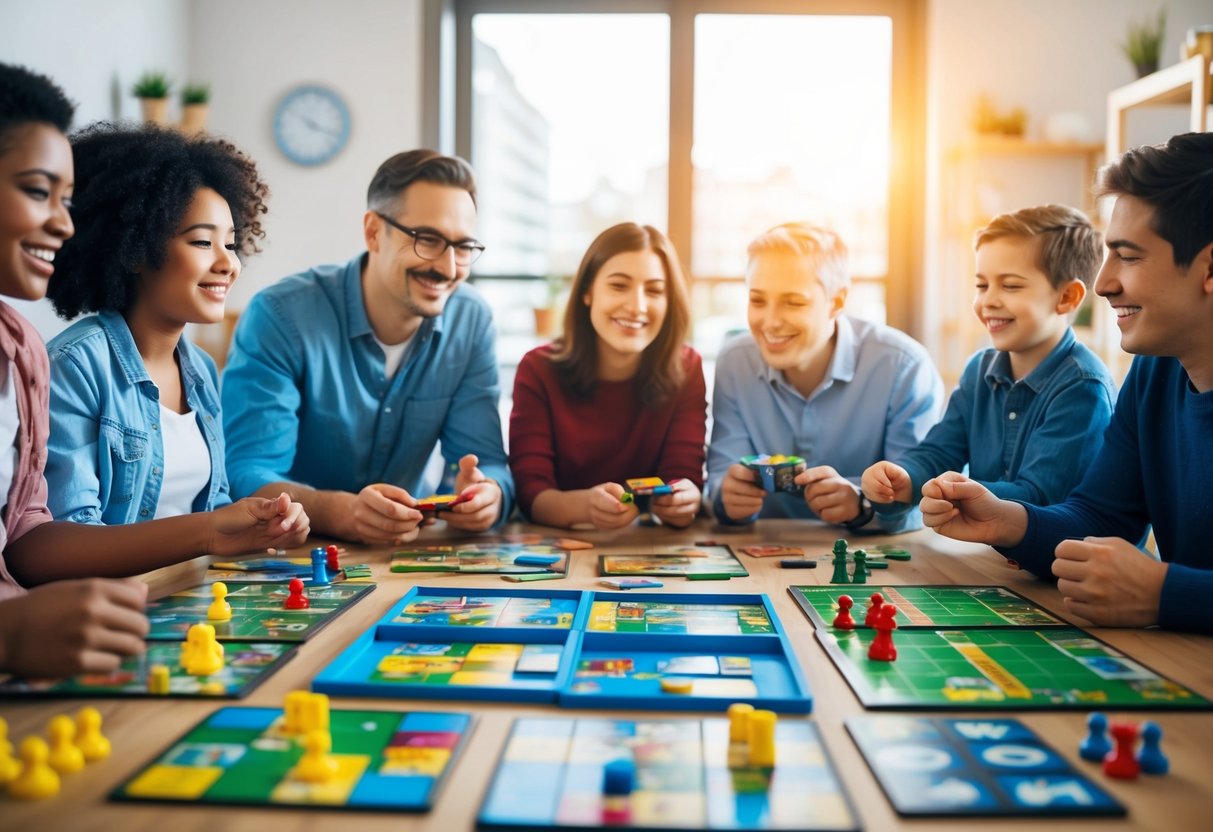
These games offer more than just entertainment. They help kids and adults alike develop problem-solving abilities and practice strategic thinking. Plus, they’re a great chance to unplug from screens and enjoy face-to-face time with our loved ones.
Whether it’s a classic like Monopoly or a new favorite, board games can suit any age group or interest. They’re perfect for rainy days, holiday gatherings, or regular family nights. Let’s dive into why these tabletop treasures are so valuable for families.
Key Takeaways
- Board games create quality family time and improve communication
- They boost cognitive skills and strategic thinking for all ages
- Playing together strengthens family bonds and creates lasting memories
The Importance of Quality Family Time
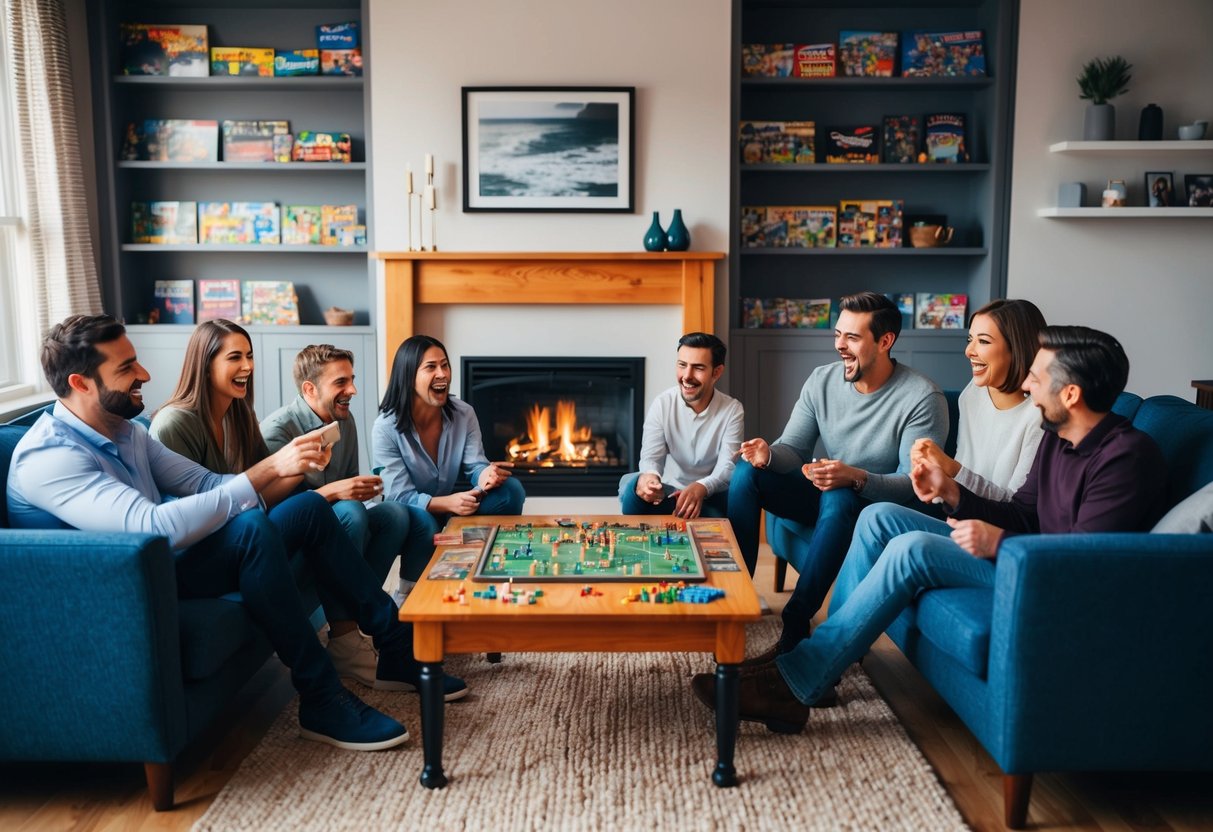
Family board games offer a great way to spend time together. We can bond, make memories, and take a break from screens.
Strengthening Family Bonds
Playing board games helps us grow closer as a family. We laugh, talk, and share fun moments. This builds trust and understanding between family members.
Board games teach us to work as a team. We learn to support each other and celebrate wins together. This teamwork carries over to daily life.
Games also help us learn about each other. We see different sides of our family members. This deeper knowledge strengthens our relationships.
Creating Lasting Memories
Board game nights become cherished family traditions. We look back on these times fondly for years to come.
Games create funny moments we’ll always remember. A lucky roll or a silly answer can turn into a family joke.
We can make deep childhood memories through these simple, quiet times. These memories help keep us close even as we grow older.
Board games mark special occasions too. Holiday game nights or summer vacation tournaments become yearly events we all look forward to.
Reducing Screen Time
Board games give us a break from TVs and phones. We focus on each other instead of screens.
This face-to-time time is so important. It helps us connect in ways screens don’t allow.
Less screen time can lower stress for the whole family. We relax and have fun without digital distractions.
Board games also spark creativity. We use our minds in new ways when we’re not relying on screens for entertainment.
Cognitive and Educational Advantages

Board games offer many learning benefits for families. They help us think better and learn new things while having fun together.
Enhancing Cognitive Function
Playing board games can boost our brain power. When we play, we use memory, focus, and strategic thinking. This helps keep our minds sharp.
Games like chess or Scrabble challenge us to plan ahead and solve puzzles. We have to remember rules and think quickly. This mental workout is great for people of all ages.
Some games even help older adults stay mentally fit. Regular play may slow cognitive decline as we age.
Promoting Learning Skills
Board games are a fun way to pick up new skills. We learn to follow rules, take turns, and play fair. These are important life lessons.
Many games teach us to be patient and handle losing gracefully. We also practice communicating and working as a team.
Problem-solving is a key skill in most board games. We figure out strategies and make decisions. This helps us become better at tackling real-life challenges.
Advancing Academic Skills
Board games can support what we learn in school. Math games help with counting and basic arithmetic. Word games boost vocabulary and spelling.
Some games teach history or science facts. Others help with geography by using maps or globe designs.
We can improve our reading skills with games that use cards or instructions. Strategy games help develop logical thinking, which is useful in subjects like math and science.
By playing together, we reinforce academic concepts in a relaxed, fun setting. This can make learning feel less like work and more like play.
Social and Emotional Benefits
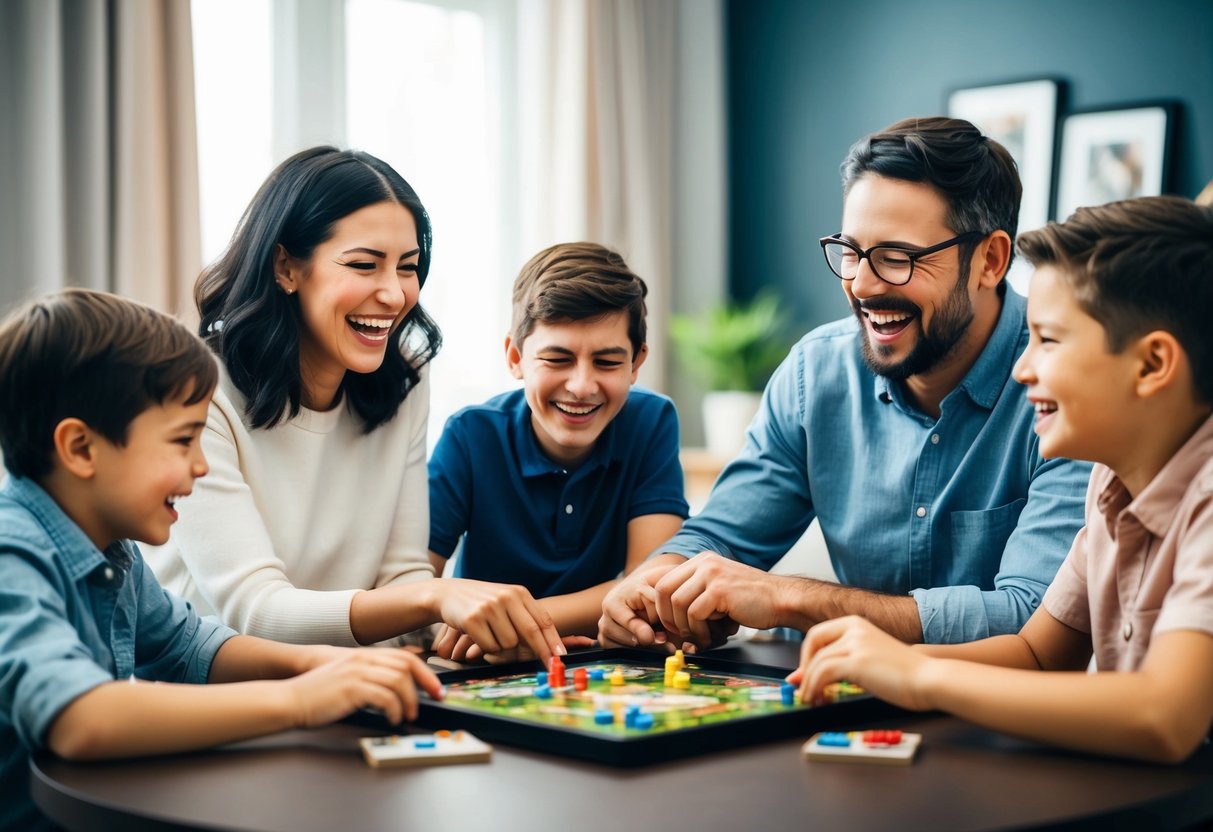
Playing board games as a family can boost our social and emotional growth. These games give us a chance to connect, learn, and have fun together.
Improving Social Skills
Board games help us get better at social interactions. We learn to take turns, follow rules, and play fair. This makes us better at getting along with others.
When we play, we practice reading facial expressions and body language. This helps us understand how others feel.
Games teach us to be patient and wait our turn. We also learn to handle winning and losing gracefully. These skills are useful in many areas of life.
Building Communication Skills
Family board game nights can improve how we talk to each other. We learn to explain our thoughts clearly when discussing game strategies.
Games often require us to describe things or tell stories. This helps us become better speakers.
We also get better at listening to others. Understanding game rules and following instructions helps us pay attention to what people say.
Some games need us to work as a team. This teaches us how to share ideas and make plans together.
Developing Empathy and Sportsmanship
Board games help us understand and care about others’ feelings. When someone loses, we learn to comfort them. If we win, we practice being kind to those who didn’t.
We discover how to cheer others on, even when we’re not winning. This teaches us to be happy for others’ success.
Games show us how to lose without getting upset. We learn that it’s okay to make mistakes and that we can always try again.
Playing together helps us bond as a family. We share laughs, work through challenges, and make happy memories.
Enhancing Strategic and Critical Thinking
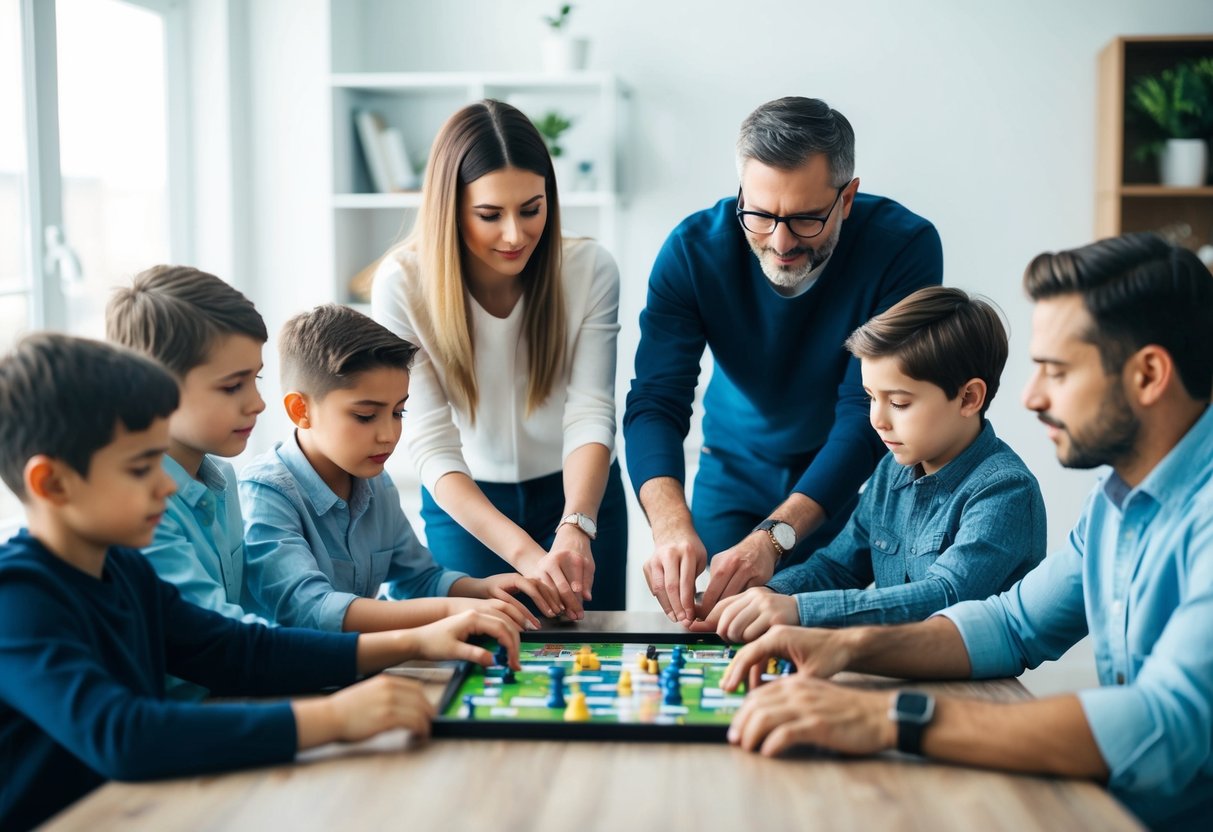
Board games offer a fun way to boost our thinking skills. They help us plan ahead, solve tricky problems, and look at things from different angles.
Fostering Strategic Planning
When we play board games, we learn to think ahead. We have to figure out our next moves and guess what other players might do. This helps us develop strategic thinking skills that we can use in real life.
For example, in chess, we need to plan several moves in advance. We think about how our actions will affect the whole game. This kind of planning is useful in school projects and everyday tasks too.
Games like Risk or Settlers of Catan teach us to manage resources. We learn to make smart choices about what to use now and what to save for later. These skills can help us with things like budgeting or planning big events.
Cultivating Problem-Solving Skills
Board games are full of challenges that we need to overcome. This helps us get better at solving problems in creative ways. We learn to look at issues from different angles and come up with new solutions.
In games like Clue or Pandemic, we have to piece together clues and information. We work together to figure out mysteries or save the world from diseases. This trains our brains to break big problems into smaller, more manageable parts.
We also learn to adapt when things don’t go as planned. If another player blocks our move, we need to quickly think of a new strategy. This flexibility is super helpful in real-life situations where plans often change.
Encouraging Critical Analysis
Board games push us to think deeply about our choices. We need to weigh pros and cons and make smart decisions. This improves our critical thinking skills.
In games like Scrabble or Boggle, we analyze letter combinations to form words. We think about which words will score the most points. This kind of analysis helps us in school subjects like math and science.
Strategy games teach us to look at the big picture. We learn to consider how our moves affect not just us, but other players too. This skill is useful in group projects or when working in teams.
By playing board games regularly, we train our brains to think more logically. We get better at spotting patterns and making connections. These skills help us in many areas of life, from doing homework to solving workplace challenges.
The Positive Impact on Mental and Physical Health

Board games can boost our mood and well-being in many ways. They help us unwind, laugh more, and even get moving. Let’s look at how family game nights can make us healthier and happier.
Facilitating Stress Reduction and Relaxation
Playing board games reduces stress and helps us relax. When we sit down for a game, we focus on fun and forget our worries for a while. This break from daily stress can lower our blood pressure and ease tension.
Games also give us a chance to socialize and connect with family and friends. Talking and laughing together strengthens our bonds. These positive interactions boost our mood and help us feel supported.
Some calming games to try:
- Puzzles
- Chess
- Scrabble
These games engage our minds without being too intense. They let us unwind while still keeping our brains active.
Promoting Laughter and Happiness
Board games are a great way to spark joy and laughter in our homes. Funny party games can have us in stitches, creating happy memories with loved ones. This shared laughter increases endorphins, our body’s feel-good chemicals.
Even competitive games can lead to giggles over silly mistakes or unexpected twists. This lighthearted fun helps us:
- Reduce anxiety
- Improve our mood
- Bond with others
Laughter is truly the best medicine. It boosts our immune system and helps us cope with stress better. By playing games that make us laugh, we’re giving our mental health a real boost.
Encouraging Physical Activity
While many board games involve sitting, some can get us up and moving. Active games add a fun twist to family game night while sneaking in some exercise.
Examples of games that promote physical activity:
- Twister
- Charades
- Physically interactive video games
These games can:
- Improve coordination
- Boost heart rate
- Enhance flexibility
Even traditional board games can involve movement. We might stand up to reach across the table or act out a clue. This light activity adds to our daily movement, which is great for our overall health.
For kids, active games help develop motor skills and burn energy. Adults benefit too, as any extra movement in our day counts towards staying healthy.
Incorporating Valuable Life Lessons

Board games offer a fun way to teach important life skills. We can use them to help our kids grow and learn in a relaxed setting.
Teaching the Importance of Following Rules
When we play board games, we all need to follow the rules. This teaches kids that rules are important in life too. We can explain why each rule matters and how it makes the game fair for everyone.
Some games have simple rules, while others are more complex. This variety helps kids learn to handle different levels of instructions. As they play, they practice reading and following directions.
We can use this chance to talk about why society needs rules. It’s a great way to show how rules keep things fair and safe for everyone.
Instilling a Sense of Patience and Resilience
Board games are perfect for teaching patience. We often have to wait for our turn, which can be hard for kids. But this waiting helps them learn to be patient in other parts of life too.
Games also teach resilience. Sometimes we lose, and that’s okay. We can show kids how to bounce back from disappointment. It’s a chance to talk about trying again and not giving up.
We can praise kids for their effort, not just for winning. This helps them see that the process of playing and learning is just as important as the outcome.
Encouraging Healthy Competition
Board games let us teach about healthy competition. We can show kids how to be good sports whether they win or lose. It’s a safe place to practice dealing with different emotions.
We can focus on having fun together, not just on who wins. This helps kids see that competition can be enjoyable without being too serious. We can point out how everyone improves as they play more.
It’s also a chance to teach cooperation. Many games need players to work together. This shows kids how teamwork can be just as rewarding as competing against each other.
Game Night Essentials
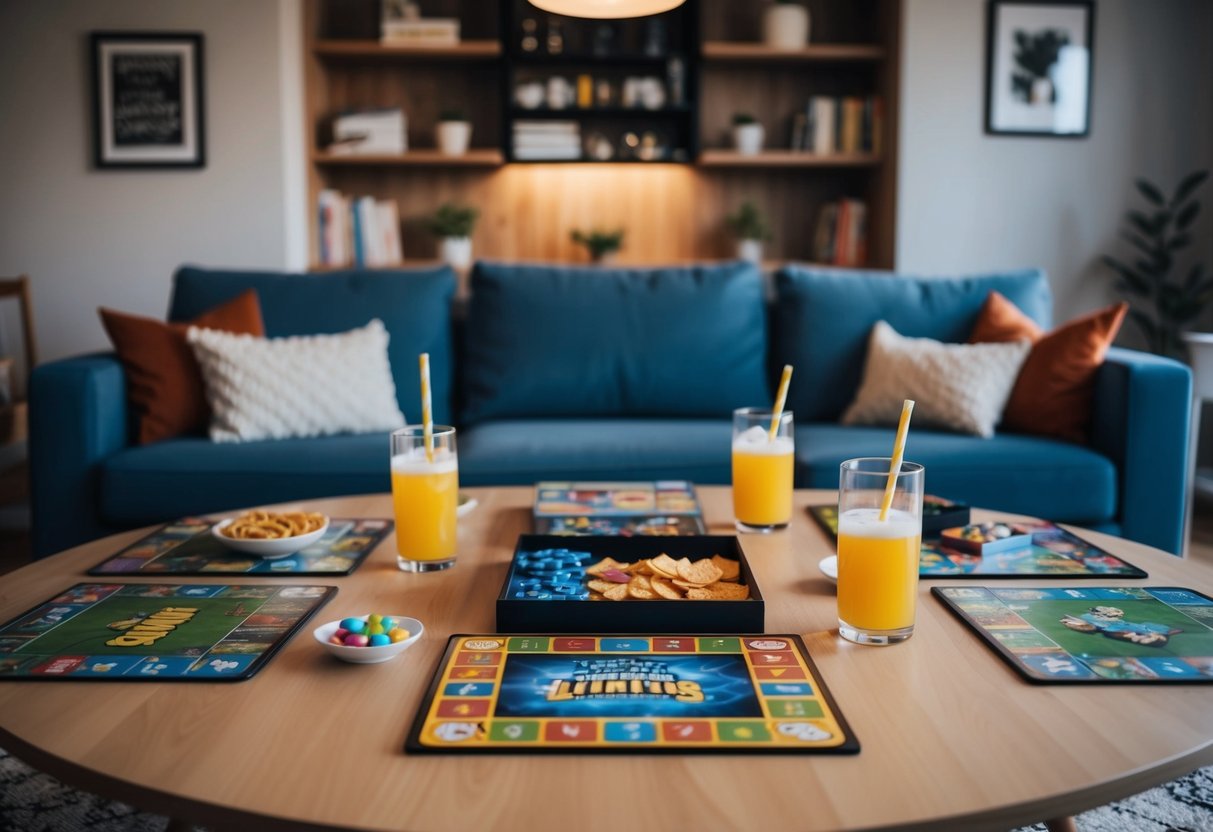
Getting ready for game night involves choosing the right games and setting up a fun environment. We’ll cover key tips to make your family game nights a success.
Selecting the Right Games for Your Family
When picking games, we need to think about everyone’s ages and interests. It’s important to choose games that cater to all ages, making sure younger kids can join in too. We might pick easier games for little ones and more complex ones for older family members.
We can mix it up with different types of games. Some nights we might play quick card games, while others we can try longer strategy games. It’s fun to have a variety to keep things exciting.
Let’s not forget to ask for input from the whole family. When everyone gets a say, game night becomes more enjoyable for all.
Classic Board Games to Enjoy
Classic board games are always a hit for family game nights. Monopoly is great for teaching money skills and strategy. Scrabble helps improve vocabulary and spelling.
For those who like building and trading, Catan is an excellent choice. It’s perfect for older kids and adults who enjoy a bit of friendly competition.
Ticket to Ride is another fun option. It’s easy to learn but offers depth for all ages. Players build train routes across a map, which can spark interest in geography.
These games have stood the test of time for good reason. They’re fun, educational, and great for bringing the family together.
Setting Up for an Engaging Game Night
Creating the right atmosphere can make game night extra special. Let’s start by picking a comfy spot with good lighting. The dining table often works well, but sometimes the living room floor can be cozier.
We should make sure there are enough chairs or cushions for everyone. Having snacks and drinks ready is always a good idea. We can prepare some healthy options like fruit and veggies along with some treats.
It’s helpful to read the rules beforehand if we’re trying a new game. This way, we can explain it easily to everyone. Setting a regular time for game night can make it a fun tradition to look forward to each week.
Fostering Creativity and Imagination

Board games can be a great way for families to boost creativity and imagination. When we play together, we open up new worlds of possibility.
Many games encourage us to think outside the box. We might need to come up with clever solutions or invent wild stories. This stretches our creative muscles in fun ways.
Games like Pictionary or Dixit are especially good for sparking imagination. We get to express ourselves through art or storytelling. It’s amazing to see what creative ideas our family members come up with!
Role-playing games let us step into different characters. We can pretend to be explorers, detectives, or even magical creatures. This enhances our imagination and helps us see things from new perspectives.
Fantasy-themed games transport us to exciting new worlds. We might find ourselves solving puzzles in enchanted forests or building civilizations on distant planets. The possibilities are endless!
By playing these games together, we create a safe space for creative expression. There’s no judgment – just fun and laughter as we let our imaginations run wild.
Frequently Asked Questions
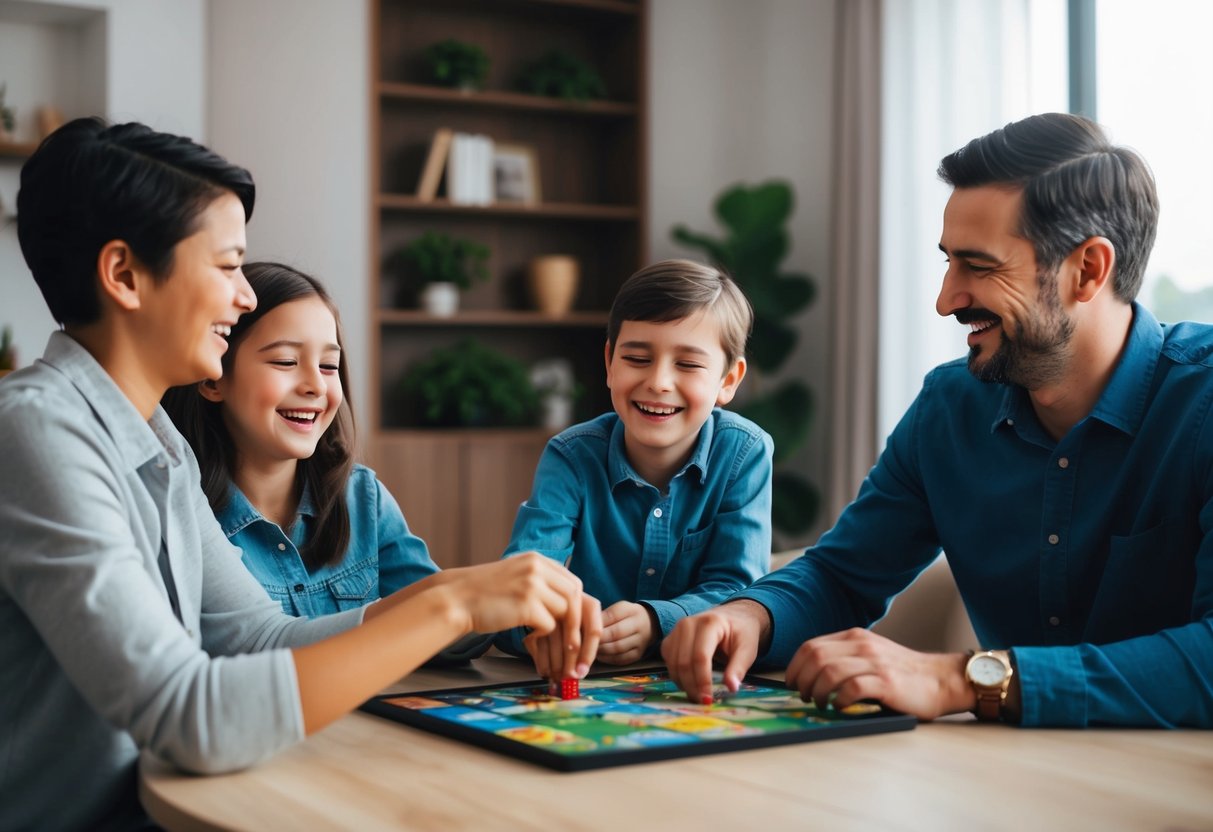
Board games offer many benefits for families, from educational advantages to mental health support. They help kids learn, bring people closer, and provide fun social experiences for all ages.
How can board games positively impact a child’s educational development?
Board games can boost creativity and imagination in kids. They help children practice math, reading, and problem-solving skills in a fun way.
Many games also teach strategy and planning, which are useful skills for school and life. Playing together gives kids a chance to learn from adults and older siblings too.
What advantages do board games provide for mental health?
Board games can reduce stress and anxiety by providing a fun distraction. They often lead to laughter and positive social interaction, which lifts our mood.
Games also give us a sense of accomplishment when we do well. This can boost self-esteem and confidence. Regular game nights can give us something to look forward to, improving our overall outlook.
In what ways do board games strengthen family bonds?
Board games create shared experiences and memories that bring families closer. They encourage communication and teamwork between family members.
Playing together gives us quality time away from screens and other distractions. It’s a chance to laugh, talk, and enjoy each other’s company in a relaxed setting.
What are the social advantages of engaging in board games among friends and family?
Board games teach important social skills like taking turns, following rules, and being a good sport. They help us practice communication and reading social cues.
For shy people, games can make socializing easier by providing a shared activity to focus on. They also create opportunities for friendly competition and banter, strengthening relationships.
How do board games support early childhood development?
Board games help young kids develop fine motor skills as they move pieces and cards. They learn to count, match colors, and recognize patterns through play.
Simple games teach toddlers about taking turns and following basic rules. This helps prepare them for more structured learning environments later on.
What are the benefits of playing board games for adults?
For adults, board games can keep our minds sharp by challenging us to think strategically and solve problems. They provide a fun way to unwind after work or on weekends.
Games also give us a chance to socialize and maintain friendships. Some complex games can even help improve decision-making skills that are useful in our careers.

